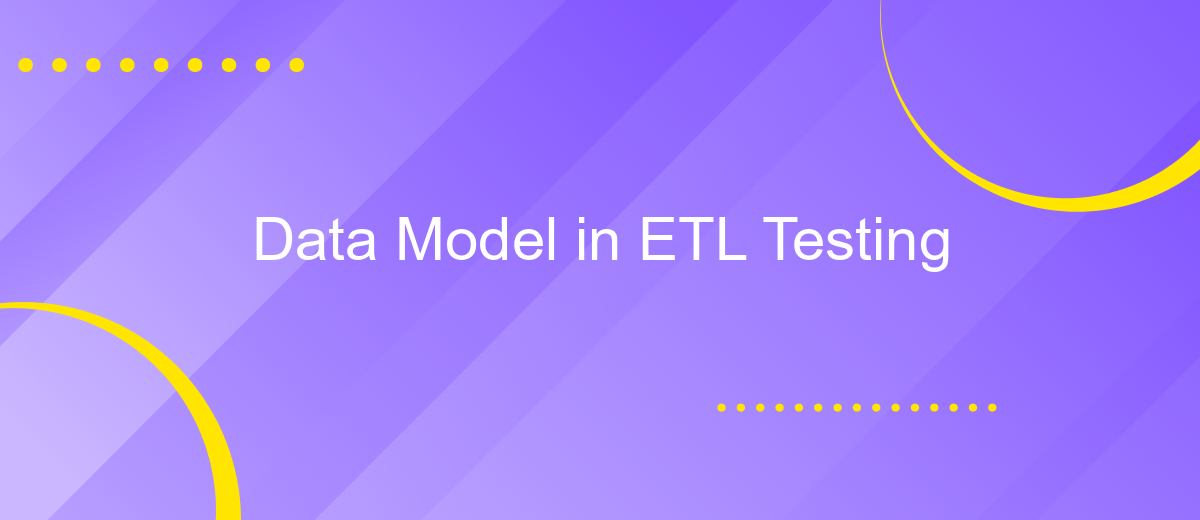Data Model in ETL Testing
In ETL (Extract, Transform, Load) testing, the data model plays a crucial role in ensuring data integrity and accuracy throughout the data pipeline. It serves as a blueprint for how data is structured, stored, and retrieved, providing a foundation for validating transformations and data quality. Understanding the data model is essential for effective ETL testing and achieving reliable data outcomes.
Introduction
Data modeling is a crucial aspect of ETL (Extract, Transform, Load) testing, ensuring that data flows accurately from source to destination. This process involves validating the data structure, relationships, and constraints to maintain data integrity and consistency. Effective data modeling in ETL testing helps identify potential issues early, reducing the risk of data discrepancies and improving overall data quality.
- Ensures accurate data flow from source to destination
- Validates data structure, relationships, and constraints
- Identifies potential issues early
- Improves overall data quality
Tools like ApiX-Drive can significantly streamline the integration process in ETL testing by automating data transfers between various systems and applications. Utilizing such services not only saves time but also enhances the reliability and efficiency of data integration tasks. As a result, businesses can focus more on analyzing data rather than dealing with integration challenges, leading to better decision-making and operational efficiency.
ETL Data Model Principles

Effective ETL data modeling is crucial for ensuring data integrity, consistency, and performance. One of the core principles is to maintain a clear separation between the staging, transformation, and final storage layers. This separation helps in managing data efficiently and allows for easy troubleshooting and auditing. Another essential principle is to design the data model to be scalable and flexible, accommodating future changes in data sources, volume, and business requirements without significant rework.
In addition to these foundational principles, leveraging integration services like ApiX-Drive can significantly streamline the ETL process. ApiX-Drive facilitates seamless data integration across various platforms, reducing the complexity of data extraction and loading. By automating data flows and ensuring real-time synchronization, ApiX-Drive helps maintain data accuracy and timeliness, which are critical for effective ETL operations. Employing such tools not only enhances efficiency but also allows data engineers to focus on more strategic tasks, thereby optimizing overall ETL performance.
Data Model Verification Techniques

Data model verification is a crucial step in ETL testing to ensure the integrity and accuracy of data as it moves through the ETL pipeline. Effective verification techniques help identify discrepancies, inconsistencies, and potential data loss, ensuring that the data model aligns with business requirements and technical specifications.
- Schema Validation: Verify that the schema of the target data model matches the expected schema. This includes checking table structures, data types, and relationships between tables.
- Data Integrity Checks: Ensure that data integrity constraints such as primary keys, foreign keys, and unique constraints are maintained throughout the ETL process.
- Data Completeness Verification: Compare source data with the target data to ensure all records have been accurately transferred and transformed.
- Consistency Checks: Validate that the data remains consistent across different stages of the ETL process, ensuring no data corruption or unintended modifications.
- Integration Testing: Use integration tools like ApiX-Drive to automate and streamline the verification of data flows between different systems, ensuring seamless data integration.
Implementing these data model verification techniques helps maintain high data quality and reliability, which are essential for making informed business decisions. By systematically validating each aspect of the data model, organizations can minimize errors and ensure their data warehouse accurately reflects the source data.
Effective Data Model Testing

Effective data model testing is crucial for ensuring the accuracy and reliability of data within an ETL process. It involves validating the structure, relationships, and constraints of the data model to ensure it meets business requirements and supports data integrity. This process helps in identifying discrepancies and errors early, reducing the risk of data quality issues in production.
To achieve effective data model testing, it is essential to have a well-defined testing strategy that includes both automated and manual testing approaches. Automated testing can quickly validate large volumes of data, while manual testing allows for more detailed inspection of specific areas.
- Define clear testing objectives and criteria.
- Use appropriate testing tools and frameworks.
- Validate data transformations and mappings.
- Ensure referential integrity and data consistency.
- Conduct performance testing to assess data handling capabilities.
Incorporating tools like ApiX-Drive can streamline the integration and testing processes by automating data transfers and ensuring seamless connectivity between various systems. This not only enhances efficiency but also reduces the likelihood of errors, making the overall data model testing more effective and reliable.
Best Practices for Data Model Validation
Effective data model validation in ETL testing hinges on a few key practices. Firstly, ensure comprehensive documentation of your data model. This includes detailed descriptions of tables, columns, data types, and relationships. Consistent and thorough documentation helps in identifying discrepancies early and facilitates smoother communication among team members. Additionally, adopting a robust data validation framework that includes automated testing scripts can significantly enhance accuracy and efficiency. These scripts should be designed to validate data integrity, consistency, and completeness across different stages of the ETL process.
Secondly, leveraging integration tools like ApiX-Drive can streamline the validation process by automating data flows between various systems. ApiX-Drive offers seamless integration capabilities, ensuring that data is accurately transferred and transformed according to the defined data model. Regularly scheduled validation checks using such tools can help in early detection of anomalies, thus reducing potential risks. Furthermore, involving stakeholders in periodic reviews and updates of the data model ensures that it remains aligned with business requirements and evolving data sources.
FAQ
What is a Data Model in ETL Testing?
Why is Data Modeling important in ETL Testing?
What are the common types of Data Models used in ETL Testing?
How can automation enhance ETL Testing processes?
What are the key challenges in Data Modeling for ETL Testing?
Strive to take your business to the next level, achieve your goals faster and more efficiently? Apix-Drive is your reliable assistant for these tasks. An online service and application connector will help you automate key business processes and get rid of the routine. You and your employees will free up time for important core tasks. Try Apix-Drive features for free to see the effectiveness of the online connector for yourself.

